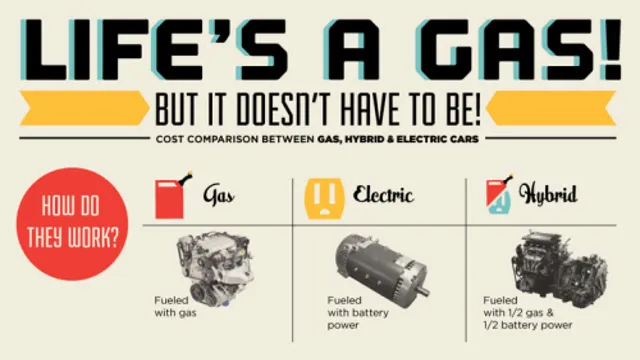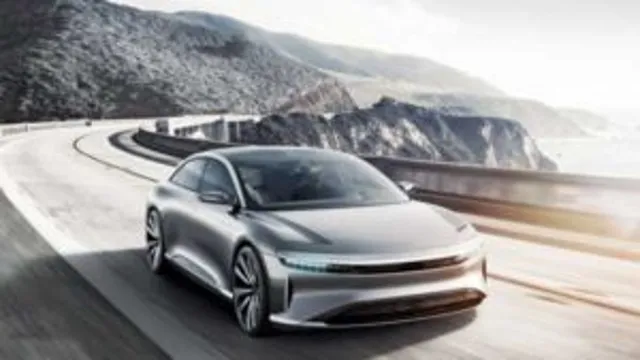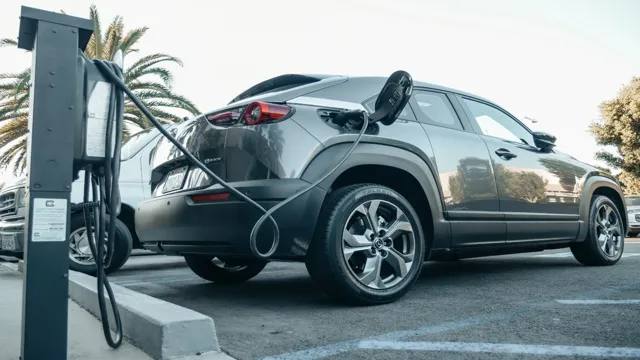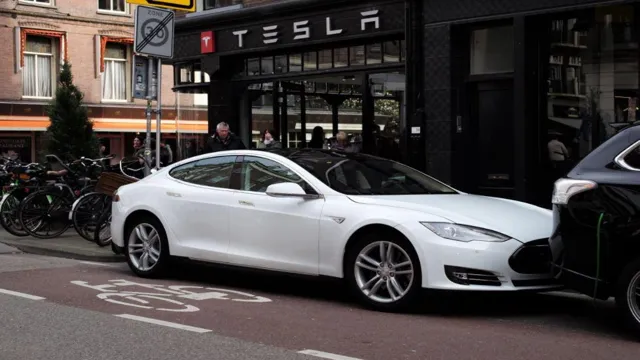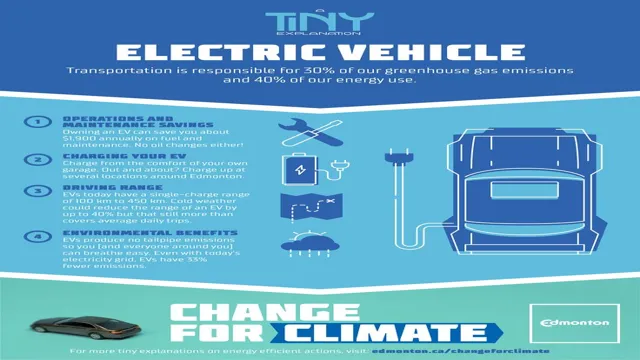The Shocking Savings: Exploring the Cost Benefits of Electric Cars
Electric cars have been increasingly making headlines in recent years. With advancements in technology and environmental concerns, it’s not hard to see why. Electric cars run on electricity instead of gasoline, which has many benefits.
They produce less greenhouse gas emissions, reduce dependence on foreign oil and provide a quieter ride experience. However, before making the switch to an electric car, many people consider the cost-benefit analysis. In this blog post, we will break down the cost-benefits of electric cars and why they may be the perfect fit for you.
Lower Operating Costs
Electric cars have become a popular choice for many consumers due to the significant cost benefit that they offer. One of the primary advantages of electric cars is their lower operating costs, which can save drivers thousands of dollars in fuel and maintenance expenses over the lifespan of the car. Since electric cars are powered by rechargeable batteries, they require significantly less maintenance than traditional gas-powered vehicles, which rely on a complex system of mechanical components to operate.
Additionally, electric cars have lower fuel costs since they do not require gasoline to run. Instead, drivers can simply charge their car at home or at charging stations located around the city. This not only saves money but also reduces environmental impact, making electric cars an attractive option for eco-conscious drivers who want to reduce their carbon footprint.
With these benefits, it’s clear to see why electric cars are becoming a popular choice for drivers looking to save money and reduce their environmental impact.
Fuel and Maintenance Savings
Lower Operating Costs One of the major benefits of using fuel-efficient vehicles is the significant savings on fuel expenses. With oil prices continuously rising, investing in a fuel-efficient vehicle can result in long-term savings. By reducing the amount of fuel consumed by the vehicle, you can lower your monthly expenses and keep your operating costs in check.
Additionally, maintenance costs can be reduced as the engine of a fuel-efficient vehicle experiences less wear and tear due to improved technology and the use of high-quality materials. A well-maintained vehicle will also require fewer repairs, resulting in lower expenses over time. By investing in a fuel-efficient vehicle, you can enjoy long-term savings on both fuel and maintenance costs.
It’s like investing in a good pair of shoes that are comfortable and durable – the initial investment can result in long-term benefits. So, is it time to consider investing in a fuel-efficient vehicle and lower your operating costs?

Tax Incentives and Rebates
Tax incentives and rebates can be a game-changer for businesses looking to lower their operating costs. By taking advantage of tax breaks offered by the government, companies can save a significant amount of money on their expenses. These incentives come in different forms and vary from state to state, but they can include tax credits for energy efficiency upgrades, R&D activities, or even hiring employees from certain demographics.
Rebates can also be offered for purchasing equipment or technologies that are more environmentally friendly or efficient. By reducing expenses through these incentives, companies can increase their bottom line and invest more in their growth and development. It’s a win-win situation for businesses and the government, as tax incentives encourage businesses to pursue sustainable practices and create jobs while reducing their tax burden.
By taking advantage of these incentives, companies can improve their financial health while contributing to a more sustainable future.
Environmental Impact
One of the significant factors when evaluating the cost-benefit analysis of electric cars is their environmental impact. Compared to traditional gas-powered vehicles, electric cars produce substantially less harmful emissions, such as carbon dioxide, nitrogen oxides, and particulate matter. By reducing the release of these pollutants, electric cars mitigate the adverse effects of air pollution and climate change.
Additionally, electric cars are more energy-efficient than gas-powered cars, with a higher percentage of the energy stored in the battery converted to power the motor. As a result, electric cars require less energy to travel the same distance, reducing the overall carbon footprint associated with their use. Despite their higher upfront cost, electric cars’ long-term benefits related to emissions reduction and energy efficiency contribute to their cost-benefit value, making them a more sustainable and environmentally responsible option in the long run.
Reduced Emissions
Reduced emissions are a critical factor to consider when evaluating the environmental impact of any operation or business. Whether it’s the transportation sector, energy production, or manufacturing, reducing emissions helps reduce the amount of greenhouse gases released into the atmosphere. This reduction, in turn, helps mitigate climate change and its attendant effects, such as rising sea levels and extreme weather patterns.
One way to reduce emissions is by moving towards renewable energy sources, such as solar, wind, and hydro power. This shift can significantly reduce greenhouse gas emissions and help move towards a more sustainable and cleaner future. In addition, adopting energy-efficient practices in buildings and homes, using low-emission vehicles, and reducing waste can also contribute to shrinking the carbon footprint.
Overall, reducing emissions is an essential and ongoing effort that can benefit not only the environment but also the economy and society as a whole.
Energy Efficiency
Energy efficiency is becoming increasingly important as we strive to reduce the environmental impact of our energy consumption. By using energy-efficient appliances, vehicles, and buildings, we can significantly reduce our carbon footprint and decrease our overall energy consumption. This not only helps to protect our planet, but it also saves us money in the long run by lowering our energy bills.
By making small changes such as switching to LED light bulbs or using a programmable thermostat, we can significantly lessen our impact on the environment and leave a better world for future generations. So, the next time you’re considering an appliance purchase or starting a construction project, think about incorporating energy-efficient options. Every small step counts in reducing our environmental impact, and by doing so, we can pave the way for a cleaner, brighter future.
Renewable Energy
Renewable energy has been hailed as the solution for our planet’s sustainability crisis, but many people may be unaware of just how beneficial it can be. One of the key advantages of renewable energy is the positive environmental impact it has compared to traditional non-renewable energy sources such as coal or oil. Fossil fuels are known to emit harmful greenhouse gases, contributing to climate change, and also cause air and water pollution.
On the other hand, renewable energy sources like solar, wind, and hydro power do not emit any pollutants or greenhouse gases into the atmosphere, making them much cleaner for the environment. Additionally, the use of renewable energy also helps to conserve natural resources and reduce our dependence on nonrenewable energy sources. By investing in renewable energy, we can create a more sustainable future for ourselves and future generations.
Long-Term Savings
When it comes to long-term savings, electric cars are the way to go. There are a number of factors that contribute to this, but the most significant is the cost benefit of owning an electric car. With rising fuel prices, conventional cars are becoming more and more expensive to run, whereas electric vehicles offer a much cheaper alternative.
Not only this, but electric cars require less maintenance than their traditional counterparts, which translates into even more savings over time. Of course, one of the biggest benefits of owning an electric car is the environmental impact. By reducing the need for fossil fuels, you are helping to protect the planet for future generations.
All in all, if you’re looking for a reliable, cost-effective vehicle that will help you save money in the long run, an electric car is definitely worth considering.
Resale Value
When it comes to buying a car, most people tend to focus on the upfront cost. But have you ever considered the long-term savings potential of your purchase? One factor that can greatly impact your overall savings is the resale value of the vehicle. Cars with high resale value can help you save big in the long run because they retain their value for longer.
This means that when you decide to sell or trade-in your car, you will get more money back. On the other hand, cars with low resale value will cost you more over time because they lose their value quickly. So, when you’re shopping for your next car, be sure to consider the resale value as a crucial factor.
With a little research, you can find a car that not only meets your needs but also helps you save money in the long run.
Reduced Depreciation
When buying a new car, the value starts to depreciate as soon as it’s driven off the lot. However, choosing a vehicle with reduced depreciation can lead to long-term savings. This means that the car will hold its value better over time, decreasing the amount of money lost when it’s eventually sold or traded-in.
Vehicles with high sales volume and a good reputation for reliability tend to have reduced depreciation rates. These types of cars also typically have a lower cost of ownership, including maintenance and repair costs. On the other hand, more luxurious or niche vehicles often have higher depreciation rates and will end up costing the owner more money in the long run.
So, when looking to purchase a new car, it’s important to consider the long-term savings that come with reduced depreciation rates.
Conclusion
In conclusion, the cost benefit of an electric car may seem initially steep, but it is important to look beyond the upfront expenses and take into account the long-term savings. In the wise words of Benjamin Franklin, “an investment in knowledge pays the best interest.” Investing in an electric car not only saves money on fuel, maintenance and repairs but also aids in reducing carbon emissions and promoting a sustainable environment.
As our planet faces the consequences of climate change, it is high time for us to make informed choices for a better, and brighter future. So, hop on board and join the green revolution with an electric car today!”
FAQs
What are the main advantages of owning an electric car in terms of cost?
Electric cars can significantly lower costs for fuel and maintenance compared to traditional gas-powered cars, due to the efficiency of electric motors and fewer moving parts.
How much can someone save on fuel costs with an electric car?
It depends on the cost of electricity in your area and the electric car’s efficiency, but some studies have found fuel savings of up to 70% compared to gas-powered cars.
Are there any incentives or tax credits available for purchasing an electric car?
Yes, many countries and states offer incentives such as tax credits, rebates, and discounts on registration fees for purchasing an electric car.
What about the long-term savings of owning an electric car?
Because of the lower fuel and maintenance costs, as well as the potential for longer-lasting batteries, electric cars may provide significant long-term savings compared to gas-powered cars.
